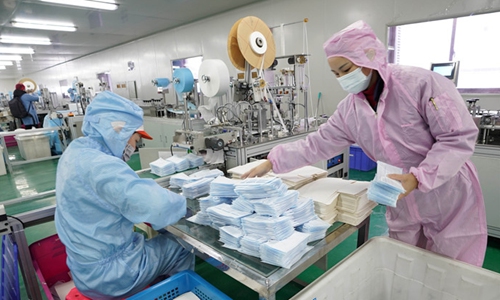China researchers develop COVID-19 virus-fighting material
By Deng Xiaoci Source:Globaltimes.cn Published: 2020/3/31 0:01:57

Photo taken on Jan 28 shows employees working at a medical products firm in Wuhan, Central China's Hubei Province. File Photo: Xinhua
Chinese researchers have developed catalytic material that can absorb and destroy the novel coronavirus (COVID-19). A recent test revealed its virus-destroying efficiency reached 96.5 to 99.9 percent, the Global Times learned from the Dalian Institute of Chemical Physics with the Chinese Academy of Sciences, the project's developer on Monday.
According to the institute, from a chemical perspective, the proteins, ribonucleic acid, fatty membranes, and other biological macromolecules contained in the virus are not as stable as regular small organic molecules and are easily hydrolyzed or inactivated by oxidation, which makes it theoretically feasible to absorb and deactivate.
The newly developed catalytic material was developed on this idea, the institute said.
Tests on the new material were conducted at the Center of Diseases Prevention and Control in Eastern China's Anhui Province, and results found the virus-deactivating efficiency was over 96.5 percent. The COVID-19 density level used in the test was 5 milligrams per milliliter, much higher any real-life situation.
Hopefully, the new material can be used for future epidemic control products and water cleaners.
The institute also revealed it had proposed a similar idea to use catalytic materials to destroy SARS at the beginning of 2003, and had submitted prototypes to the People's Liberation Army's (PLA) Academy of Military Medical Sciences for further tests, which revealed that the selected materials were effective in the fight against SARS.
The material was not used because when they reached their designated performance, the SARS outbreak had been contained, the institute said.
Additionally, the similarities between the SARS coronavirus and COVID-19 inspired the team to resume the study on new materials to see if they could destroy it.
The institute has already manufactured over 100 kilograms, and is capable of producing several tons.
The material can be customized accordingly for air filters and face masks. The institute is seeking cooperation with a company to develop products based on the materials to provide new solutions to contribute to China's and the world's fight against COVID-19.